

The best AI tools for research papers and academic research (Literature review, grants, PDFs and more)
As our collective understanding and application of artificial intelligence (AI) continues to evolve, so too does the realm of academic research. Some people are scared by it while others are openly embracing the change.
Make no mistake, AI is here to stay!
Instead of tirelessly scrolling through hundreds of PDFs, a powerful AI tool comes to your rescue, summarizing key information in your research papers. Instead of manually combing through citations and conducting literature reviews, an AI research assistant proficiently handles these tasks.
These aren’t futuristic dreams, but today’s reality. Welcome to the transformative world of AI-powered research tools!
This blog post will dive deeper into these tools, providing a detailed review of how AI is revolutionizing academic research. We’ll look at the tools that can make your literature review process less tedious, your search for relevant papers more precise, and your overall research process more efficient and fruitful.
I know that I wish these were around during my time in academia. It can be quite confronting when trying to work out what ones you should and shouldn’t use. A new one seems to be coming out every day!
Here is everything you need to know about AI for academic research and the ones I have personally trialed on my YouTube channel.
My Top AI Tools for Researchers and Academics – Tested and Reviewed!
There are many different tools now available on the market but there are only a handful that are specifically designed with researchers and academics as their primary user.
These are my recommendations that’ll cover almost everything that you’ll want to do:
Want to find out all of the tools that you could use?
Here they are, below:
AI literature search and mapping – best AI tools for a literature review – elicit and more
Harnessing AI tools for literature reviews and mapping brings a new level of efficiency and precision to academic research. No longer do you have to spend hours looking in obscure research databases to find what you need!
AI-powered tools like Semantic Scholar and elicit.org use sophisticated search engines to quickly identify relevant papers.
They can mine key information from countless PDFs, drastically reducing research time. You can even search with semantic questions, rather than having to deal with key words etc.
With AI as your research assistant, you can navigate the vast sea of scientific research with ease, uncovering citations and focusing on academic writing. It’s a revolutionary way to take on literature reviews.
- Elicit – https://elicit.org
- Litmaps – https://www.litmaps.com
- Research rabbit – https://www.researchrabbit.ai/
- Connected Papers – https://www.connectedpapers.com/
- Supersymmetry.ai: https://www.supersymmetry.ai
- Semantic Scholar: https://www.semanticscholar.org
- Laser AI – https://laser.ai/
- Inciteful – https://inciteful.xyz/
- Scite – https://scite.ai/
- System – https://www.system.com
If you like AI tools you may want to check out this article:
- How to get ChatGPT to write an essay [The prompts you need]
AI-powered research tools and AI for academic research
AI research tools, like Concensus, offer immense benefits in scientific research. Here are the general AI-powered tools for academic research.
These AI-powered tools can efficiently summarize PDFs, extract key information, and perform AI-powered searches, and much more. Some are even working towards adding your own data base of files to ask questions from.
Tools like scite even analyze citations in depth, while AI models like ChatGPT elicit new perspectives.
The result? The research process, previously a grueling endeavor, becomes significantly streamlined, offering you time for deeper exploration and understanding. Say goodbye to traditional struggles, and hello to your new AI research assistant!
- Consensus – https://consensus.app/
- Iris AI – https://iris.ai/
- Research Buddy – https://researchbuddy.app/
- Mirror Think – https://mirrorthink.ai
AI for reading peer-reviewed papers easily
Using AI tools like Explain paper and Humata can significantly enhance your engagement with peer-reviewed papers. I always used to skip over the details of the papers because I had reached saturation point with the information coming in.
These AI-powered research tools provide succinct summaries, saving you from sifting through extensive PDFs – no more boring nights trying to figure out which papers are the most important ones for you to read!
They not only facilitate efficient literature reviews by presenting key information, but also find overlooked insights.
With AI, deciphering complex citations and accelerating research has never been easier.
- Aetherbrain – https://aetherbrain.ai
- Explain Paper – https://www.explainpaper.com
- Chat PDF – https://www.chatpdf.com
- Humata – https://www.humata.ai/
- Lateral AI – https://www.lateral.io/
- Paper Brain – https://www.paperbrain.study/
- Scholarcy – https://www.scholarcy.com/
- SciSpace Copilot – https://typeset.io/
- Unriddle – https://www.unriddle.ai/
- Sharly.ai – https://www.sharly.ai/
- Open Read – https://www.openread.academy
AI for scientific writing and research papers
In the ever-evolving realm of academic research, AI tools are increasingly taking center stage.
Enter Paper Wizard, Jenny.AI, and Wisio – these groundbreaking platforms are set to revolutionize the way we approach scientific writing.
Together, these AI tools are pioneering a new era of efficient, streamlined scientific writing.
- Jenny.AI – https://jenni.ai/ (20% off with code ANDY20)
- Yomu – https://www.yomu.ai
- Wisio – https://www.wisio.app
AI academic editing tools
In the realm of scientific writing and editing, artificial intelligence (AI) tools are making a world of difference, offering precision and efficiency like never before. Consider tools such as Paper Pal, Writefull, and Trinka.
Together, these tools usher in a new era of scientific writing, where AI is your dedicated partner in the quest for impeccable composition.
- PaperPal – https://paperpal.com/
- Writefull – https://www.writefull.com/
- Trinka – https://www.trinka.ai/
AI tools for grant writing
In the challenging realm of science grant writing, two innovative AI tools are making waves: Granted AI and Grantable.
These platforms are game-changers, leveraging the power of artificial intelligence to streamline and enhance the grant application process.
Granted AI, an intelligent tool, uses AI algorithms to simplify the process of finding, applying, and managing grants. Meanwhile, Grantable offers a platform that automates and organizes grant application processes, making it easier than ever to secure funding.
Together, these tools are transforming the way we approach grant writing, using the power of AI to turn a complex, often arduous task into a more manageable, efficient, and successful endeavor.
- Granted AI – https://grantedai.com/
- Grantable – https://grantable.co/
Best free AI research tools
There are many different tools online that are emerging for researchers to be able to streamline their research processes. There’s no need for convience to come at a massive cost and break the bank.
The best free ones at time of writing are:
- Elicit – https://elicit.org
- Connected Papers – https://www.connectedpapers.com/
- Litmaps – https://www.litmaps.com ( 10% off Pro subscription using the code “STAPLETON” )
- Consensus – https://consensus.app/
Wrapping up
The integration of artificial intelligence in the world of academic research is nothing short of revolutionary.
With the array of AI tools we’ve explored today – from research and mapping, literature review, peer-reviewed papers reading, scientific writing, to academic editing and grant writing – the landscape of research is significantly transformed.
The advantages that AI-powered research tools bring to the table – efficiency, precision, time saving, and a more streamlined process – cannot be overstated.
These AI research tools aren’t just about convenience; they are transforming the way we conduct and comprehend research.
They liberate researchers from the clutches of tedium and overwhelm, allowing for more space for deep exploration, innovative thinking, and in-depth comprehension.
Whether you’re an experienced academic researcher or a student just starting out, these tools provide indispensable aid in your research journey.
And with a suite of free AI tools also available, there is no reason to not explore and embrace this AI revolution in academic research.
We are on the precipice of a new era of academic research, one where AI and human ingenuity work in tandem for richer, more profound scientific exploration. The future of research is here, and it is smart, efficient, and AI-powered.
Before we get too excited however, let us remember that AI tools are meant to be our assistants, not our masters. As we engage with these advanced technologies, let’s not lose sight of the human intellect, intuition, and imagination that form the heart of all meaningful research. Happy researching!
Thank you to Ivan Aguilar – Ph.D. Student at SFU (Simon Fraser University), for starting this list for me!

Dr Andrew Stapleton has a Masters and PhD in Chemistry from the UK and Australia. He has many years of research experience and has worked as a Postdoctoral Fellow and Associate at a number of Universities. Although having secured funding for his own research, he left academia to help others with his YouTube channel all about the inner workings of academia and how to make it work for you.
AI Tools For Academic Research: Top 10

The world of academic research is constantly evolving, and artificial intelligence (AI) is playing a significant role in transforming the research landscape. From finding sources to analyzing data, AI-powered tools are making the research process more efficient and accurate. This article provides our roundup of the top 10 AI tools that are revolutionizing academic research .
Reviewing AI Software for Academic Researchers
What’s the toughest part of advancing in your postgraduate studies? For a multitude of students, the challenge lies in tackling the enormous amount of research required. As well as structuring it and putting all observations on paper.
The sheer number of research articles one needs to go through can be intimidating. Additionally, research material tends to be complex, making it difficult to extract the necessary information. This process demands a significant amount of time and effort. Organizing your insights and articulating them in a coherent, insightful, and scholarly manner presents yet another obstacle in postgraduate research. While AI tools for academic research can help with that issue, the essay writing sites can facilitate the process of finalizing the findings.

The Choice of The Number 1 AI Tool for Academia: Best Solution
Postdoctoral researcher Mushtaq Bilal believes that ChatGPT will revolutionize academic research, but acknowledges that many academics don’t know how to use it effectively. Academia is split between early AI adopters and those concerned about its impact on academic integrity . Bilal, an early adopter, believes that AI language models can democratize education and promote greater knowledge if used thoughtfully.
Top List of the Academic Research Software
Several experts have raised concerns about the reliability of language models like ChatGPT, noting that their output, when used as a best AI text generator , can sometimes be biased, limited, or inaccurate. However, Bilal argues that being aware of these limitations and adopting the right approach can enable language models to perform valuable work, particularly in academia.

You can ask Consensus about relationships between concepts, or even cause and effect, like whether immigration improves the economy. It’ll give you an answer based on academic research, even listing the papers and summarizing the top ones.
But it’s got a limited scope, though. It only covers six areas: economics, sleep, social policy, medicine, mental health, and health supplements. Still, it seems like a handy resource for those topics.
It saves time by providing quick access to research-backed answers on the covered topics. Consensus bases its answers on academic research, increasing the credibility of the information. The tool provides summaries of the top articles it analyzes, making it easier to understand complex research.
It’s an easily accessible way for users to gain knowledge about specific topics without needing extensive research skills. By providing research-backed answers, Consensus promotes evidence-based thinking.
- Efficient research
- Credible sources
- Encourages evidence-based decision making
- Limited scope
- Potential bias
- AI limitations
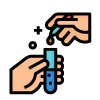
Elicit is like a research assistant that uses language models to answer questions, but it’s entirely based on research. This makes it a solid source for having “intelligent conversations” and brainstorming sessions.
What’s cool is that it can find relevant papers even without exact keyword matches, and it can summarize them, making it a handy paper typer that pulls out the key details.
Elicit’s knowledge is solely based on research, which ensures a more reliable and verified source of information. It can find relevant papers without needing perfect keyword matches, making it easier to discover important research.
- Research-based knowledge
- Flexible search
- Supports creative thinking
- Limited to research
- Accessibility

Scite uses AI to provide detailed citation information for research papers, helping researchers evaluate the credibility of their sources. This service is really helpful for getting real citations from actual published papers. It’s great for improving workflows. Scite gives you answers to questions with a detailed list of cited papers. Plus, it tells you the exact number of times a claim has been refuted or corroborated in various journals, making it a powerful tool.
- Accurate citations
- Improves workflow
- Fact-checking capability
- Potential for user error
Research Rabbit
Research Rabbit is a tool for fast-tracking research, and the best part is that it’s free!
It can be called “Spotify of research.” Users can create collections of academic papers that the software can learn from to give them relevant recommendations. Plus, it even visualizes scholarly networks in graphs, so it’s possible follow the work of specific authors or topics.
- Time-saving
- Personalized recommendations
- Limited to academic papers
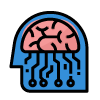
ChatPDF = “like ChatGPT, but for research papers”. It could be useful for reading and analyzing journal articles.
Basically, you start by uploading a PDF of the research paper into the app, and then you can start asking it questions. ChatPDF will then generate a short summary of the paper and provide examples of questions that it can answer based on the full article.
This could really speed up the process of reading and analyzing research papers, which can be a time-consuming task.
- Summarization capabilities
- Question examples
Perplexity AI
Perplexity AI can potentially become a number 1 tool for academic research. Arguably better than ChatGPT, Perplexity boasts functions that its famous rival doesn’t have. So what exactly is Perplexity AI?
It’s another AI search engine with powerful academic research abilities. PerplexityAI has access to a variety of different sources, which makes information completely up-to-date. The tool can draw information not only from the Internet, which most other services do well, but also from scholarly sources, WolframAlpha, YouTube, Reddit, news, and Wikipedia. After typing in a search query, a user can specify where exactly they want to receive the information from, and the tool will do the task. Additionally, it can search across individual domains or websites or summarize their content.
A significant advantage of Perplexity is its advanced functionality when searching for academic materials. Not only does it give you the result, but it also offers a list of related questions and references. This is an edge compared to ChatGPT, especially GPT-3.5, which often makes users question the relevance or even existence of the references it provides.
With all these features onboard, apps for essay , and Chrome extension, Perplexity is an excellent AI tool for academic research.
- Actual scholar references
- Available for iPhone (Android app is coming)
- Many credible sources of data
- Clunky functionality with PDFs
- Lacks AI conversational skills

Semantic Scholar
Semantic Scholar is an academic search engine driven by artificial intelligence that enables users to filter through millions of scholarly pieces for educationally appropriate content related to their research subject. It integrates artificial intelligence, machine learning, and language processing with semantic analysis to provide users with precise search outcomes.
Using machine learning methodologies, Semantic Scholar deciphers significance and discovers links within academic papers. It then presents these findings, facilitating scholars in rapidly acquiring a comprehensive understanding.
- Highlights the most crucial elements of a paper
- Free to use
- The limited scope of fields for research
- Narrow evaluation metrics of scholarly articles
- Does not search for material behind a paywall

Iris.ai is an artificial intelligence tool designed to aid researchers in scientific discoveries. The service uses natural language processing and machine learning algorithms to comprehend the context of a research project and suggest pertinent literature. It helps navigate and find data sources without relying on specific keywords, making it significantly more efficient than traditional search engines.
Content-based search, context and data filtering, and extracting and systematizing data are just a few of the many other functions of this versatile research tool.
- Fast and easy to use
- Has access to vast databases of research articles, including open access papers
- Dependent on the accuracy and quality of the AI algorithms
- Not the best choice for marketing research or economics

Paper Digest
Updated August 28, 2023: he service has stopped operations and the website is no longer maintained. Paper Digest is an AI-based academic article summarization service that aims to help researchers quickly grasp the core ideas of a paper without reading the whole thing. It automatically lists out the key sentences of a paper, taking about 10 seconds to do so. It can also reduce reading time to 3 minutes. The service also imitates researcher behavior by automatically summarizing the paper and helping them decide whether it is worth reading. However, Paper Digest may not be suitable for researchers who require more detailed summaries or who need to capture all the nuances of the original paper.
- Can be accessed from any device
- Can be used for free
- Works only with open-access papers
- The summaries may not capture all the nuances of the original paper

SciSpace is an AI-powered platform that aims to modernize scientific research workflows and collaboration. It offers a suite of tools to discover, read, write, collaborate, and publish research papers. It also links users to more than 45,000 verified journal formats that researchers can select from, making it more suitable than Word for research writing.
SciSpace is a useful service for those looking for an easy and quick way to understand scholar papers. Its AI-powered features and personalized suggestion engine can help researchers stay on track while gaining a comprehensive understanding of the topic.
- Personalized suggestion engine
- 40,000+ journal templates and processes 30,000+ papers per month
- Has a grammar and spell-checking systems
- Issues with exporting to different journal formats
- The free plan is quite basic and lacks major features
AI-powered tools are transforming the way we approach academic research, making it more efficient, accurate, and accessible. By leveraging the capabilities of these top 10 AI tools, researchers can save time, improve the quality of their work, and contribute to groundbreaking discoveries in their respective fields .
Best Tips How to Make the Most of AI Tools as a PhD student
PhD students employ AI-chatbots, such as ChatGPT, to enhance their studies and boost efficiency. Some ways they use AI-chatbots include:
- Summarizing texts for quicker reading and idea mapping.
- Checking the validity of individual arguments on different aspects.
- Exploring comprehensiveness by discussing generated options and seeking additional possibilities.
- Testing counterfactuals by presenting arguments and asking for opposing viewpoints.
- Preparing for a jury by sharing arguments and requesting ten related questions.
- Requesting critiques on arguments for improvement.
PhD students can also:
- Direct prompts from the perspective of a renowned book on the topic.
- Use ChatGPT as a writing mentor for thesis and research papers.
- Utilize it for basic proofreading of academic texts, adjusting tone and voice as needed, and rating the original text on a scale of 1 to 10.
- Generate an outline of a dissertation’s main chapter using ChatGPT-generated prompts.
- Employ the “freewriting” technique, writing down unfiltered thoughts, then prompting ChatGPT to refine the text for a scientific publication using appropriate language.
Why academichelp.net is a credible source of information:
Stay curious with us. Academichelp.net has been a reliable educational resource since 2011, providing students with the latest news, assignment samples, and other valuable materials. Even with the extensive information we process, our quality remains consistent. Each team member has experience in education, allowing us to evaluate new sector offerings critically. Our reviews are up-to-date and relevant, with impartiality ensured by the A*Help score methodology from mystery shopping. We aren’t affiliated with any listed service providers. Our focus remains on providing our audience with reliable and unbiased data.
What is the best AI academic research tool?
Choosing the best AI platform for academic research depends on your priorities and preferences. Our experience suggests that the top choice is often a website that combines various services in one place.
Is there a free AI academic research tool?
Yes, there are free AI academic research tools. Many platforms do not require subscriptions or additional payments. Some websites also provide new clients with a free trial to test certain features. Most of these solutions are mentioned in our top list, so be sure to check it out to find the AI service that suits you best.
Which AI model supports academic research?
Academic research is primarily facilitated by language models that use NLP (natural language processing) and deep learning to gather relevant data and generate different types of content. One of the major companies developing language models is OpenAI, with its latest releases including GPT-3, GPT-3.5, and GPT-4 AI. Other popular language models are LamDa, used by Google, and LLaMA, adopted by Meta and its social media companies.
What is the best free AI for academic research?
To identify the best free AI-powered platform for academic research, you need to determine your specific needs, such as text generation, reference finder, rephrasing tool, or other services.
Students also ask
Can ai be used for research.
Absolutely! AI is a valuable tool for research, aiding in data analysis, pattern recognition, and simulations. So, when you feel a little stuck when doing research for your assignments, you can try out an AI helper.
Which AI is best for research?
The ideal AI for research purposes depends on the specific field’s needs and goals! Different AI models excel in various tasks, so there is no definitive answer to that question unless you do a bit of research first.
How is AI used in scientific research?
AI is very often used in scientific research for a number of reasons. It can easily analyze vast datasets, simulate different experiments, and assist the person, helping researchers uncover new insights and continue their work.
Is there an AI that can read scientific papers?
Yes, there are AI systems capable of doing so. They can extract the necessary information from scientific papers according to the prompt you give the system.
What is the smartest AI today?
Determining the smartest AI is subjective since it can be used for a variety of needs. However, models like GPT-3 and GPT-4 have demonstrated remarkable language processing and comprehension abilities, which can significantly ease the process of writing or compiling information.
Can AI discover new knowledge?
AI plays a crucial role in discovering new knowledge by identifying correlations, suggesting hypotheses, and aiding in data analysis. It helps researchers to make certain discoveries. Although AI is getting more and more popular each day, it cannot replace humans and should rather be used as a tool.
Is AI going to replace scientists?
AI is not poised to replace scientists, writers, or anyone for that matter. Instead, it enhances their capabilities, enabling more efficient and effective research, which leads to accelerated progress. Human impact is undeniably necessary when working with AI, even though it may seem the other way.
Can AI discover new things?
Certainly! AI sometimes can discover new things by analyzing data and detecting patterns. This way AI is contributing to scientific advancements and expanding our understanding of the world.
Useful AI solution articles
- Khanmigo: Khan Academy’s AI Solution to Enhance Learning and Tackle Classroom Challenges
- Doctrina AI: Artificial Intelligence for Learning
- Introducing Wisdolia: The AI-Powered Flashcard Generator
- StudyWand: An AI-Powered Tool for Exam Preparation
AI trends and latest news
- Malaysia’s Ministry of Higher Education Developing Guidelines for ChatGPT Usage in Universities
- OpenAI Expert, Anna Bernstein, Shares Tips for Crafting Effective AI Chatbot Prompts
Follow us on Reddit for more insights and updates.
Comments (2)
Welcome to A*Help comments!
We’re all about debate and discussion at A*Help.
We value the diverse opinions of users, so you may find points of view that you don’t agree with. And that’s cool. However, there are certain things we’re not OK with: attempts to manipulate our data in any way, for example, or the posting of discriminative, offensive, hateful, or disparaging material.
Cancel reply
Your email address will not be published. Required fields are marked *
Save my name, email, and website in this browser for the next time I comment.
What’s the guarantee that inputs provided is not being snooped by someone at the backend? In other words,
I get your concern, but these tools are meant to assist researchers, not replace them. We still need to apply critical thinking!
Remember Me
What is your profession ? Student Teacher Writer Other
Forgotten Password?
Username or Email
June 18th, 2024
Top 10 AI Tools for Research
By Josephine Santos · 10 min read

In an era where artificial intelligence (AI) reshapes every facet of life, academic research has not been left untouched. AI tools have become a cornerstone for scholars and students alike, revolutionizing the way research is conducted. From data analytics to natural language processing to math solving , these AI tools are not just aiding in the collection of data but are enhancing the accuracy and efficiency of academic pursuits. Here's a glimpse into the top 10 AI tools that are reshaping academic research in 2024, ensuring researchers can gather more precise information faster than ever before.

1. Google Scholar
Julius is an AI tool tailor-made for modern academic research. It distinguishes itself by offering personalized assistance in statistical analysis and literature review, making it an invaluable asset for students and researchers alike. With Julius, users can analyze datasets, visualize data trends, and receive guidance on structuring their research findings. Its advanced data processing capabilities offer a much less frustrating experience than R or SPSS for both new and practiced researchers.
3. Paperguide
Paperguide is a popular AI platform for collecting, understanding, and producing research papers. Save time manually searching through academic paper repositories with Paperguide's AI Search feature, and synthesize collected literature with their AI Research Assistant.


5. Research Rabbit

9. SciSpace (Typeset.io)
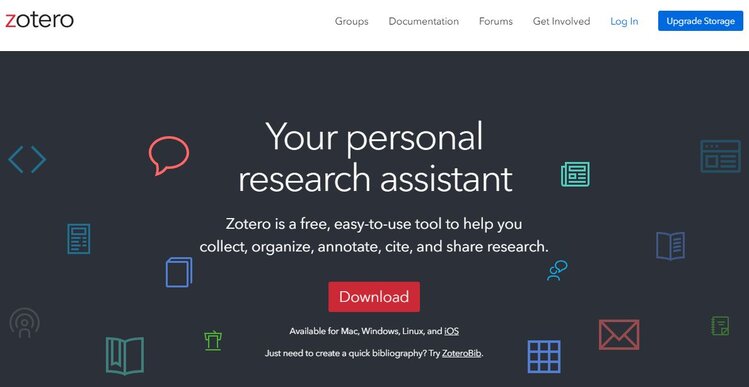
Choosing the Right AI Tool
— Your AI for Analyzing Data & Files
Turn hours of wrestling with data into minutes on Julius.

Revolutionizing Research: 17 Best AI Tools Every Academic Needs (Free + Paid)
In the constantly changing world of academic research, Artificial Intelligence (AI) has brought a significant shift in how we find knowledge and analyze data.
The time-consuming process of manually sorting data and the constraints of traditional research methods are becoming things of the past. Now, AI tools are leading the way in academic advancements, giving researchers new ways to explore deeper, analyze more precisely, and discover more effectively.
In this article, we’re thrilled to present the top 17 AI tools that are reshaping academic research. These tools aren’t just improving research processes; they are transforming them in fundamental ways. From using machine learning for intricate data analysis to applying natural language processing to find key insights in extensive literature, each tool on our list is opening up exciting new possibilities for researchers.
Whether you’re an experienced researcher or just starting, these AI tools are set to expand what’s achievable in research.
1. Scite AI
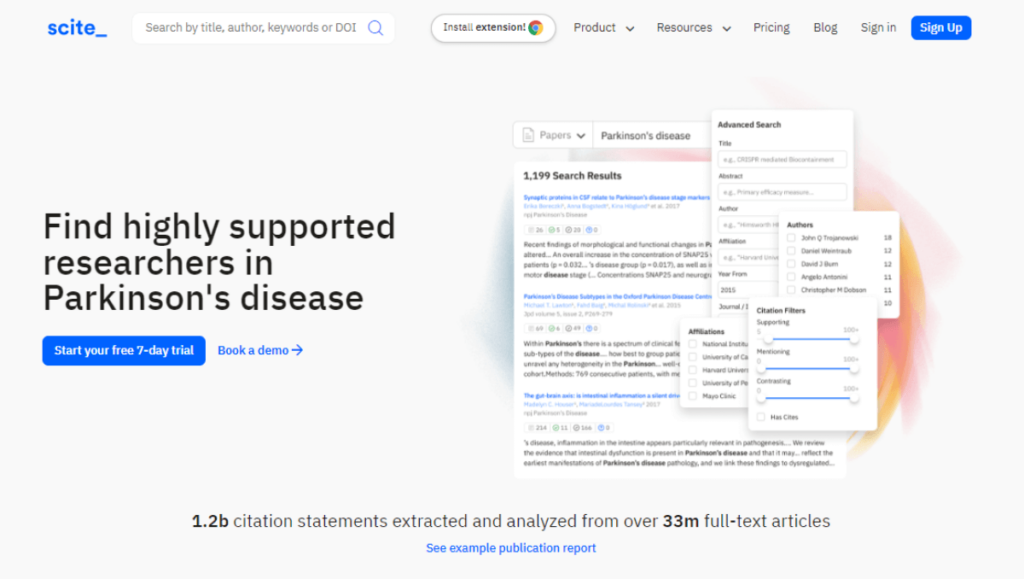
Scite.ai is a tool that uses AI to analyze scientific literature and measure the veracity of scientific work. It offers a free browser extension that allows users to see how any research article has been cited on the go. Users can highlight any term or phrase on any page, right-click, and select “Search citation statements” to surface information from research articles that might support or offer some disagreement from those claims.
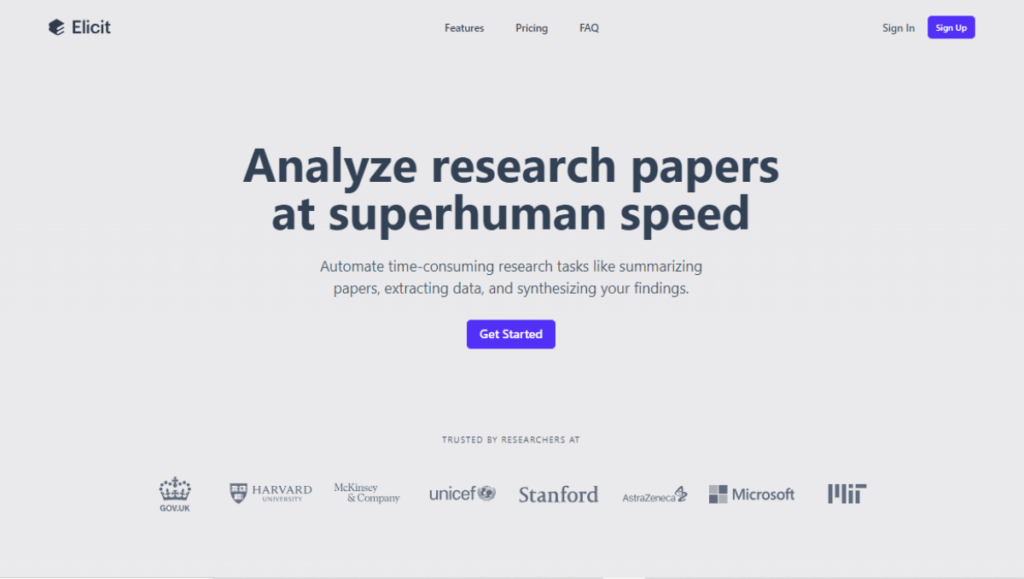
Elicit is an AI-powered research assistant that is designed to revolutionize the way scientific literature reviews are conducted. The platform is being developed to automate the more laborious aspects of the literature review process, making it a valuable tool for researchers and scientists. The team behind Elicit includes experienced professionals from diverse backgrounds, including growth, engineering, and economics.

Sapien, created by AcademicID, is an AI-based research assistant tailored for academics, researchers, and students. It uses advanced machine learning and NLP to deliver precise answers from over 200 million academic papers, ensuring up-to-date and verifiable information. Sapien stands out from other AI tools with its access to the latest research. It’s also available as a browser extension for easy access.
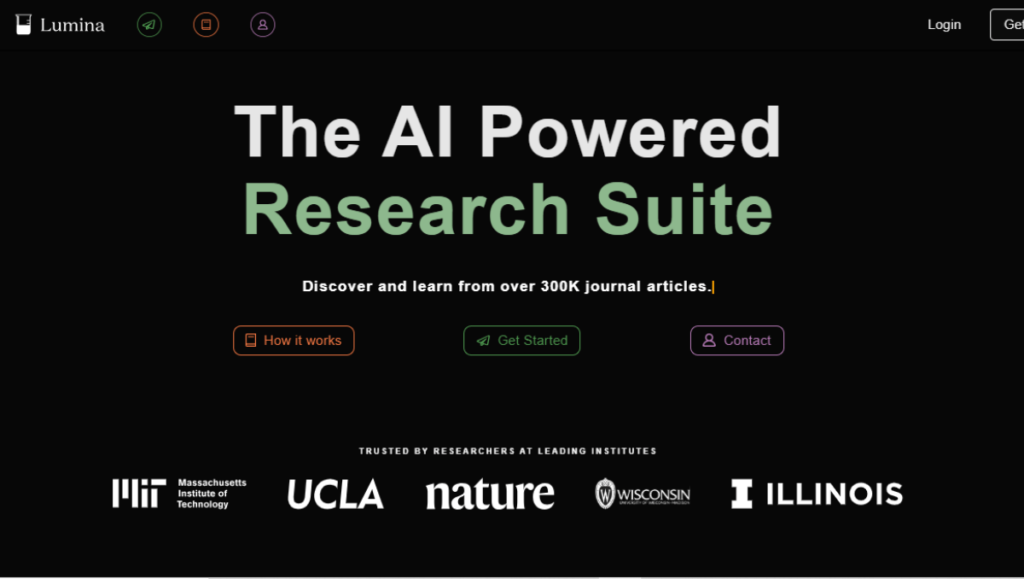
Lumina is an AI-driven research tool designed for exploring and comprehending scientific literature. It features a chat interface for document interaction and delivers well-referenced, precise answers to inquiries. This suite includes a growing database of around 200,000 papers, covers various subjects, and responds to requests for including specific journals. Additionally, it generates a list of pertinent references for further study.
5. SciSpace
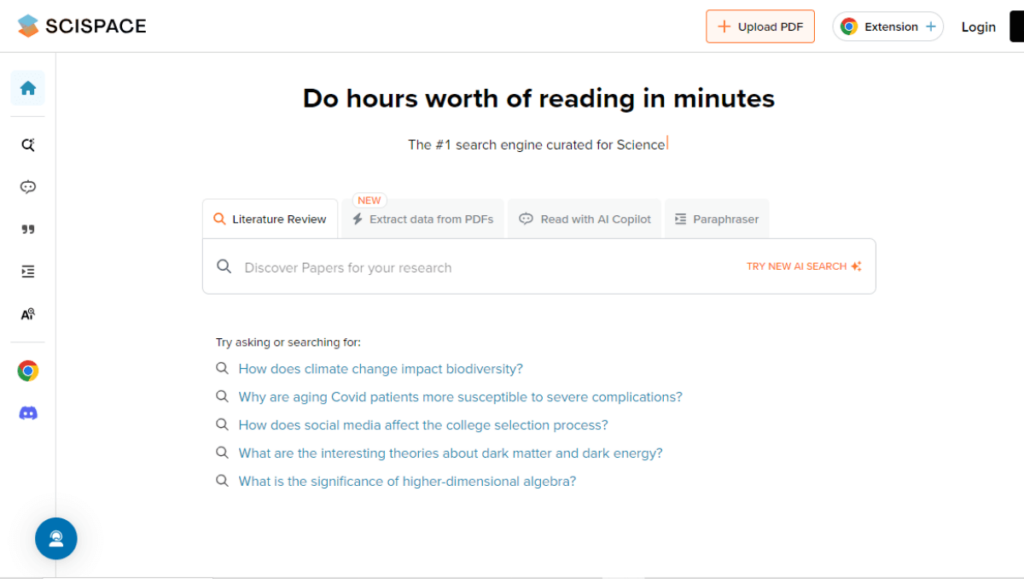
SciSpace is an AI-powered research platform with a vast database of 270 million+ papers, authors, and academic events. It features tools like a plagiarism checker, journal submission assistance, XML converters, and an AI assistant for interpreting research. Additionally, it offers numerous paper templates and services to simplify publication, along with personalized suggestions for papers, topics, and conferences, plus a collection of 40,000+ journal templates.
6. Sourcely
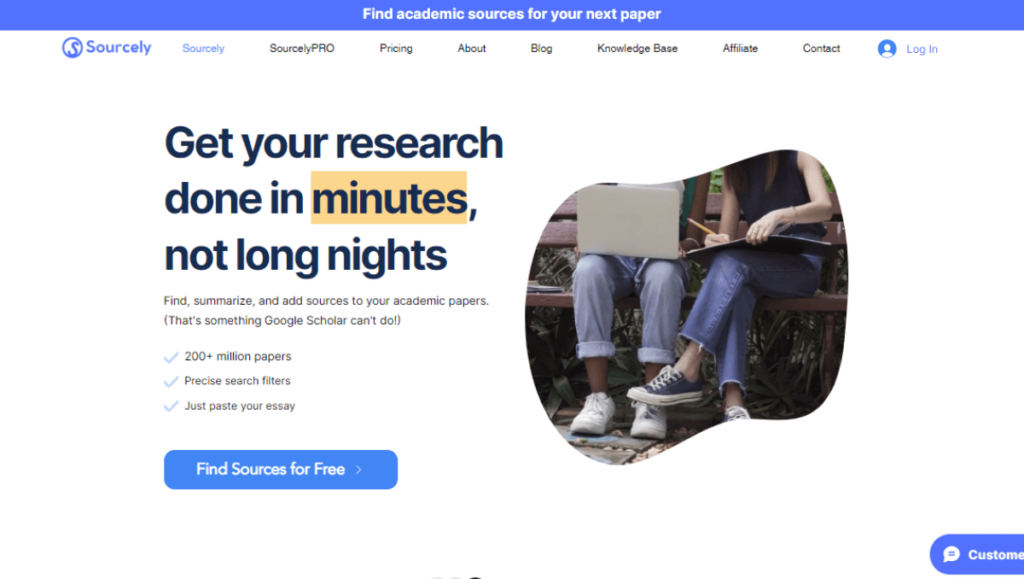
Sourcely is an AI-powered research tool that significantly streamlines the process of sourcing and summarizing literature for students, academics, and writers. With access to over 200 million papers, it offers a precise search filter, efficiently retrieving relevant sources and reducing research time. This platform is not only about finding accurate sources but also about enhancing the overall efficiency of the research process, making it a valuable resource for various academic and writing tasks.
7. ResearchRabbit
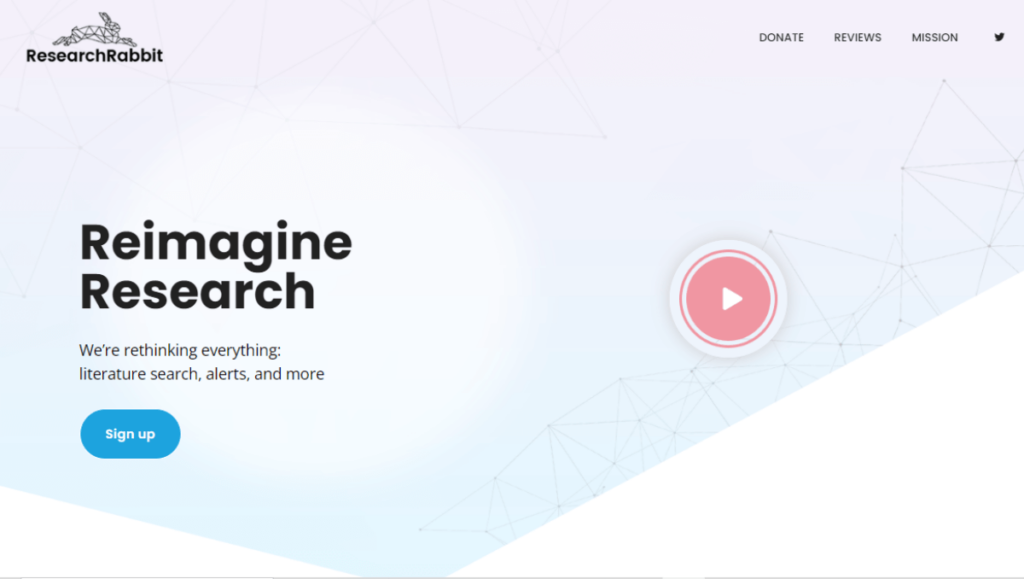
ResearchRabbit is a powerful platform designed for researchers. It provides a novel way to search for papers and authors, monitor new literature, visualize research landscapes, and collaborate with colleagues. The platform is committed to empowering every step of your research. It’s a tool that connects researchers with opportunities and makes the process of discovery much more efficient.
8. OpenRead

OpenRead is a cutting-edge platform transforming the research landscape through advanced AI technology. It offers a streamlined, efficient solution for researchers to consolidate notes and knowledge. OpenRead’s goal is to boost research productivity and drive progress in science, technology, and humanitarian areas. Integrating AI tools into the research process, OpenRead enhances capabilities and fosters new innovations.
9. Layer.app
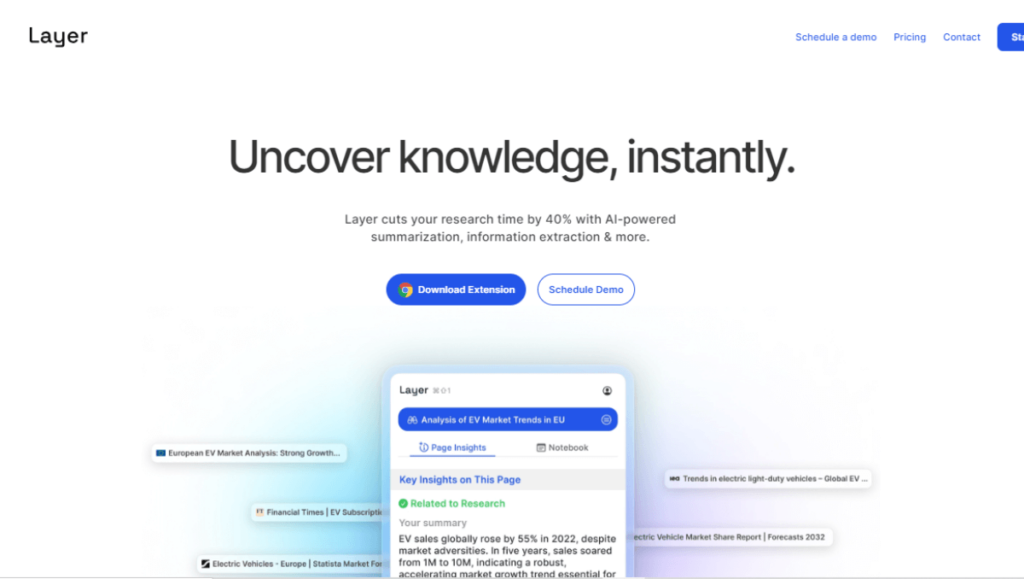
Layer is an AI-powered research assistant designed to supercharge your research process. It’s built to cater to a wide range of research use cases, including journalistic investigations, scientific discovery, strategy consulting, market analysis, patent searches, competitive intelligence, M&A research, academic research, and policy research.
The platform is designed to extract key insights instantly based on your research goals, deliver precise answers with sources for quick fact-checking, and make sense of complex reports in an instant. It also allows you to capture notes with sources, making it easier to reference and organize your research.
10. Notably
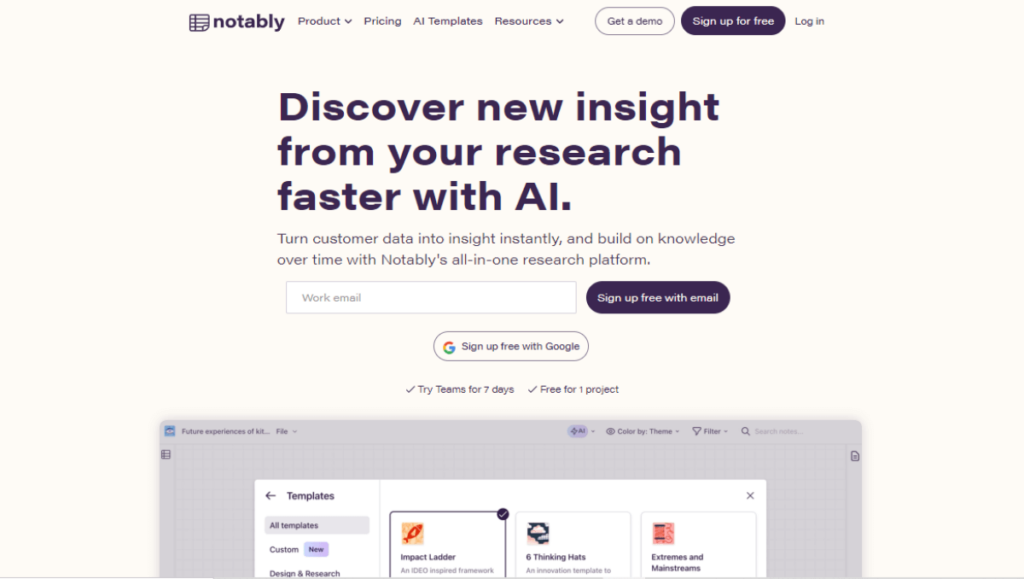
Notably is an AI-assisted platform for researchers to analyze complex data. It features auto highlighting, tagging that improves with use, and templates for quality synthesis. The platform supports data organization on a canvas, in tables, or through interactive charts. It also converts research into interactive insights with AI-generated images, serving as a unified repository for data and insights.
11. PaperBrain
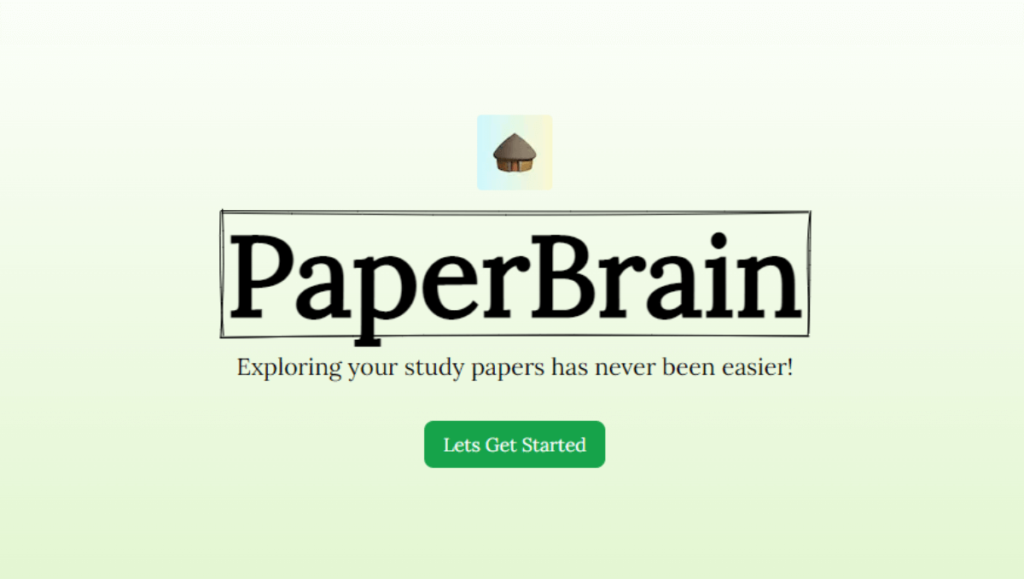
Paperbrain provides a platform for you to access and understand research papers. You can explore your study papers with paper abstracts and direct pdf links, so you don’t have to deal with tedious downloads. You can also get help from a GPT assistant that can answer your questions and guide you along.
12. Semantic Scholar
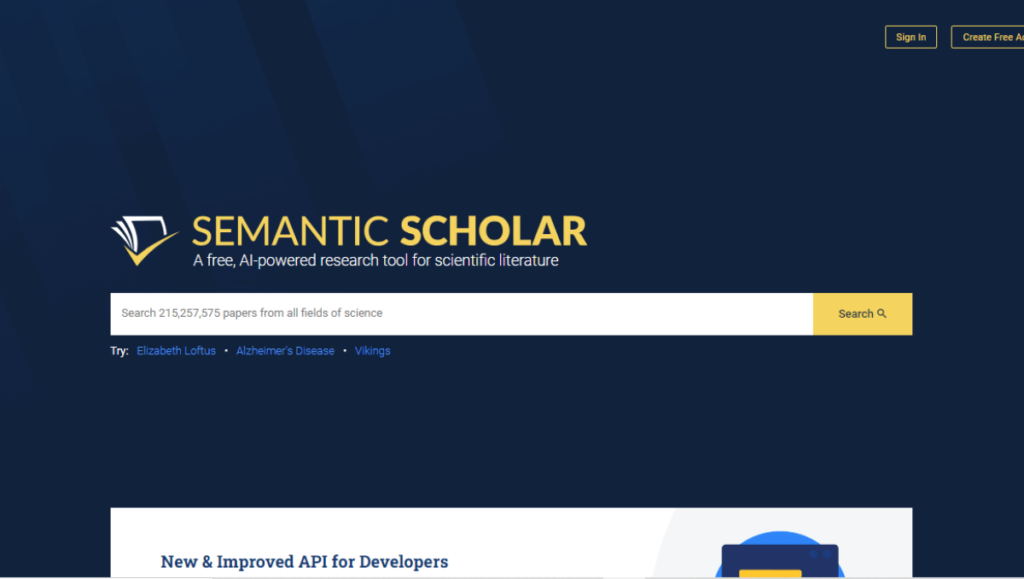
Semantic Scholar is an AI-driven platform designed to accelerate scientific breakthroughs. It offers free search and discovery tools, indexing over 200 million academic papers from various sources. Its key feature is understanding papers quickly by extracting insights and identifying connections, aiding researchers in staying current with scientific literature.
13. MirrorThink
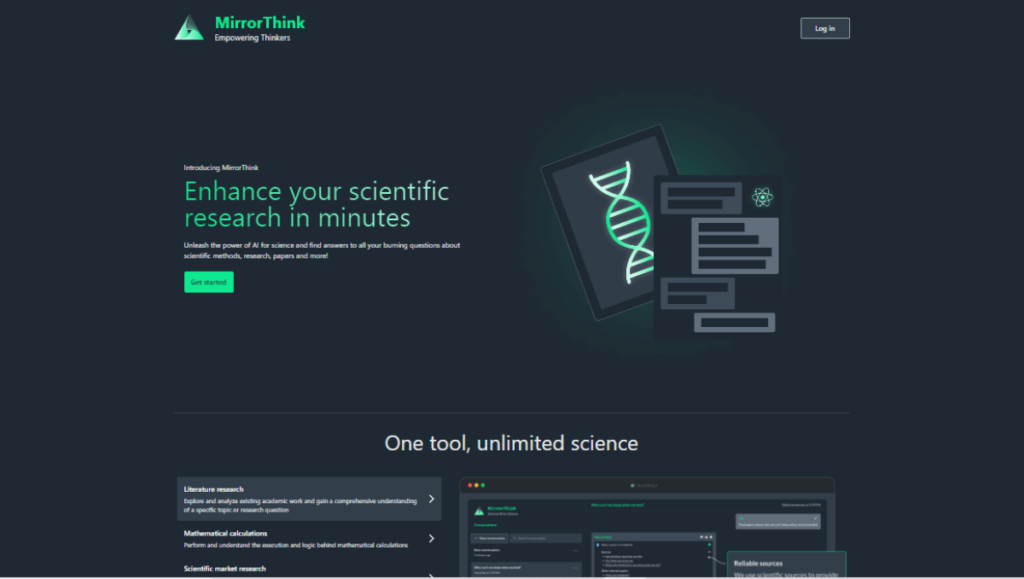
MirrorThink, an AI-driven scientific research tool, combines in-depth analysis, mathematical computation, and market insights. Utilizing GPT-4’s advanced AI technology, it ensures precision, reliability, and speed. This tool significantly enhances research efficiency by providing quick and accurate answers and methodologies, making it an essential asset for researchers seeking to expedite their discoveries.
14. Epsilon AI
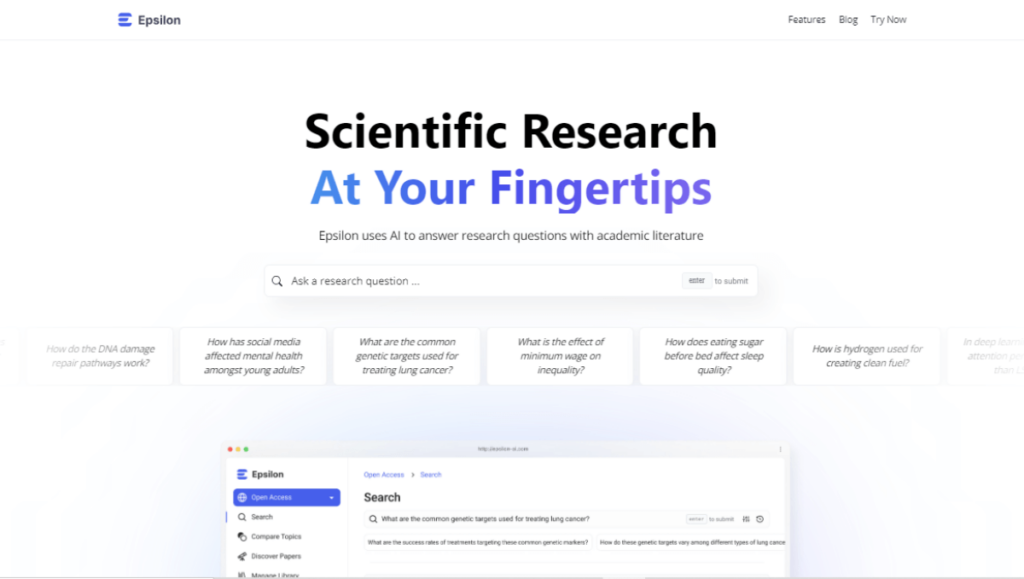
Epsilon is an AI-driven research platform that quickly answers research questions using over 200 million academic papers. It parses and summarizes texts for swift literature reviews, allowing users to refine questions, explore various perspectives, and receive suggestions for follow-up inquiries. Additionally, Epsilon AI offers features for starting literature reviews, where users can save key papers to custom libraries or upload their own through PDF or URL.
15. Feynman

Feynman AI is a cutting-edge tool aiding academic research. It streamlines reading, writing, and comprehending academic papers. Features include an AI-powered research library, question-answering about read content, flashcards for rapid learning, and a comparison tool for identifying similarities and differences between papers. Essentially, it serves as a holistic research assistant, enhancing efficiency and accessibility in academic research.
16. Scholarcy
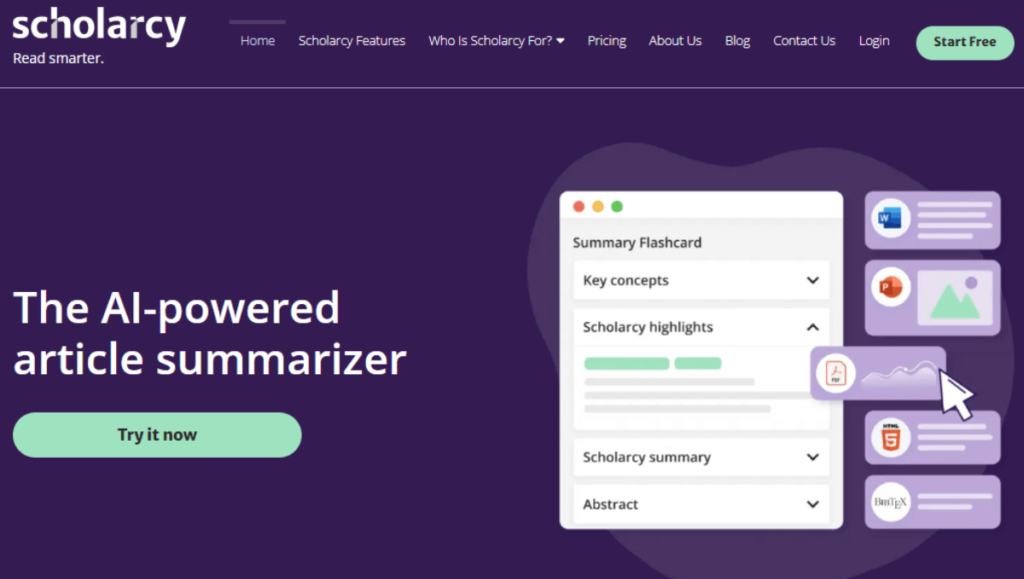
Scholarcy is an online summarizing tool that can read your research articles, reports and book chapters and break them down into bite-sized sections with key information such as study participants, data analyses, main findings and limitations. It also generates summary flashcards that highlight key concepts, definitions, sources and comparisons. It is a tool for students and researchers who want to quickly assess how important any document is to their work and save time on appraising, writing and revising.
17. AcademicGPT
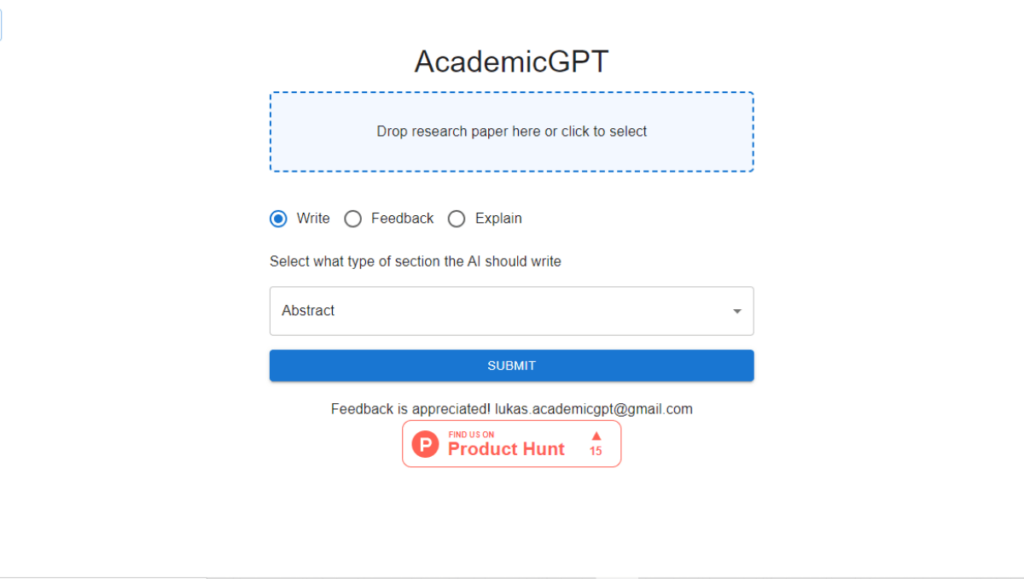
AcademicGPT is an AI tool for aiding academic writing. It uses advanced NLP to provide smart suggestions and create quality content, increasing writers’ productivity and efficiency. It features a chat interface, allows PDF uploads, and assists with abstract generation and feedback, streamlining the writing process.
As we wrap up our look at the 17 best AI tools for academic research, it’s evident that these advanced technologies are transforming how we conduct research and analyze data. Each tool we’ve explored brings unique features that can greatly improve the efficiency, precision, and scope of your research projects.
We urge you to explore these AI tools and add them to your research arsenal. They offer significant potential to boost your research skills and make a deeper impact in your field. By embracing AI, you can take your academic work to new levels. The future of research is in your hands, and with these tools, it looks more promising than ever.

Top 7 AI Tools for Research 2024

Table of Contents
There was a time when AI tools for research were a rarity. But that’s no longer the case. Niche-specific AI tools are becoming the new norm, and AI tools for research are an integral part of this trend. Designed specifically for researchers, students, and academics, AI research tools can now help you with literature review, data analysis, academic writing, automating tedious tasks and checks and more. Several journals and institutions now also allow the use of AI tools, with proper acknowledgement.
But here’s the thing, you can’t just pick the best AI tool for research and expect it to handle all phases of your research workflow. It’s never a one-size-fits-all deal. You need to be smart about it, analyzing what’s out there and choosing tools that are relevant to your research needs, whether they’re free or paid.
So, how do you navigate this AI jungle and choose the best AI tools for research ? We’ve got you covered. Here are our top 7 picks that will transform your research journey.
Disclaimer: This article is based on independent research and is intended to provide an unbiased comparison of various AI writing tools, including our own. While we strive to present accurate and up-to-date information, features, and pricing, we recommend checking directly with the respective companies for the latest details, as offerings may change over time. Additionally, any opinions expressed here reflect the author’s perspective and may not represent the official stance of the companies/tools discussed.
Paperpal
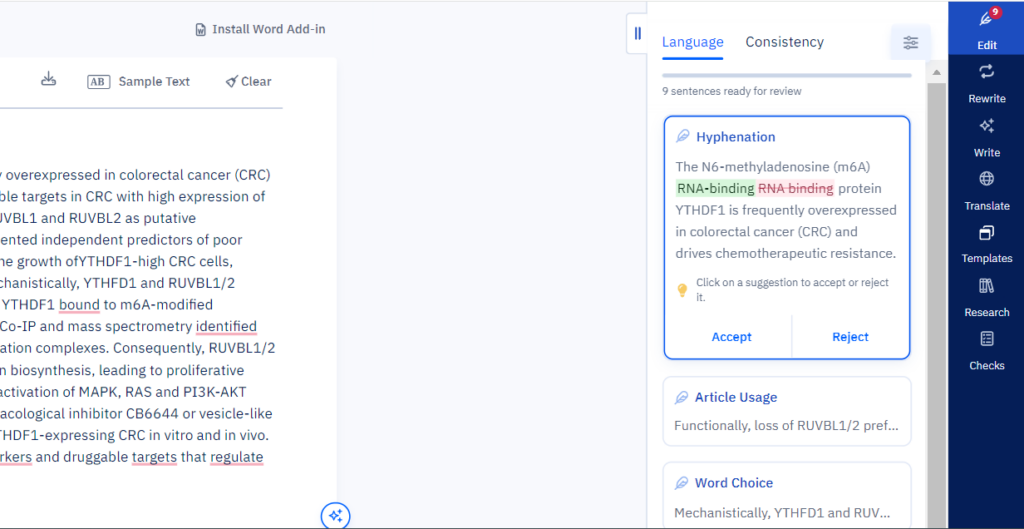
Paperpal is an all-in-one AI research and writing assistant that helps you edit, write, search, cite and submit with confidence – all at one place. Paperpal is trained on millions of scholarly articles, 22+ years of STM expertise and 2.5 million hours of editorial expertise. This enables it to understand and preserve the academic context, ensuring that your text aligns with academic writing conventions. Unlike other AI research tools that require prompts to generate the desired output, Paperpal delivers precise results without the need for detailed prompting.
- In-depth Language Checks: Paperpal provides 200+ free language suggestions based on scientific contexts, while retaining domain-specific terminology, scientific jargon, and non-English words
- In-built Search: Get science-backed answers with verified citations to your questions from over 250 + million research articles across all key disciplines. You can also save relevant articles to your Citation Library, which helps you to research, write, and cite on-the go
- Citation Generator: Generate unlimited citations in APA, MLA, Chicago and 10,000+ styles for your references
- Predictive Writing: Add a starting sentence of over 10 words, and Paperpal’s Write will offer suggestions based on context, custom instructions, or pre-set writing prompts. With Paperpal Write, you can quickly create a first draft, expand on existing content, write a counterargument, and much more
- Plagiarism Checker: Paperpal checks your paper for similarity against a database of 99 billion online webpages and provides you with a free similarity score. You can also choose the detailed plagiarism report with color-coded results and side-by-side comparisons to help you address actionable items, cite overlooked sources, and avoid accidental plagiarism
- Academic Translation: Paperpal leverages DeepL to provide accurate, high-quality translation for 30+ language pairs without changing the context or meaning
- Academic Consistency Checks: Paperpal’s consistency checks ensure style uniformity in the presentation of p-values, symbols, and statistics
- Generative AI Writing Templates: Generate outlines and titles, create abstracts, summaries, study highlights, or craft powerful emails to journals in a click – and without the need of writing extensive prompts
- Rewrite: Accurate paraphrasing and instant word reduction up to 20% to help you meet journal prescribed word counts. Paperpal also ensures a formal academic tone and retains the meaning of your work in the output
- Submission Readiness : – Paperpal offers 30+ language and technical compliance pre-submission checks to boost your manuscript’s chance of acceptance
- AI Review: Instant, targeted advice on your draft to identify logical gaps and improve flow and readability before submission
- Human Editing: Get a professional human editor to review your manuscript to enhance quality, ensuring it meets high academic standards
Paperpal – Pros and Cons
Paperpal – Pricing Plans
Paperpal provides Free and Paid plans with access to the following features tailored to enhance academic writing. You get access to the following features:
- Language suggestions – 200/month
- Rewrite (Paraphrase, Trim, and more)
- Research (Search and Cite)
- Templates to kickstart writing
- Predictive Writing
- Translate
- Generate unlimited citations
- Check plagiarism for free up to 7,000 words
- Free submission readiness report
Paperpal’s Prime plan unlocks unlimited access to all the free features, plus consistency checks and 10,000 words/month of plagiarism checks at just US$25/month, US$55/quarter or US$139 per year.
R Discovery
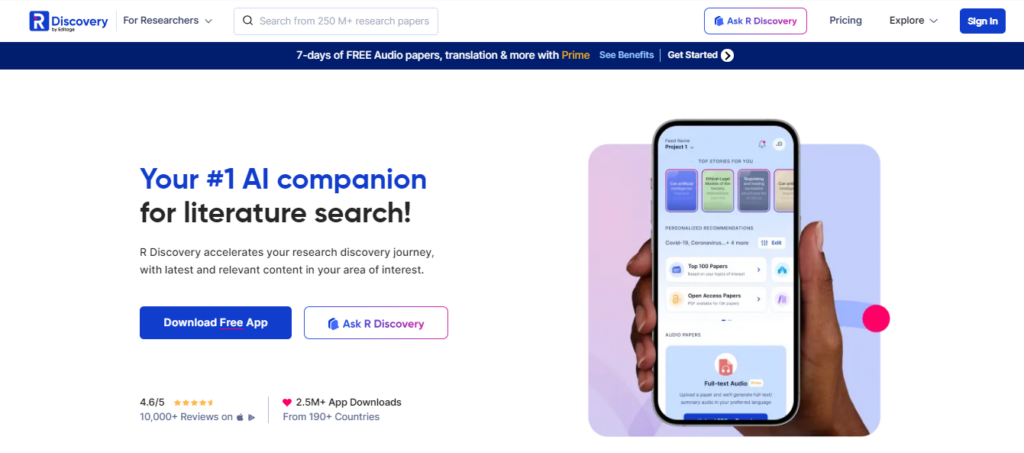
R Discovery is a literature search and research reading platform that simplifies your journey to find and read the most relevant research papers. It provides personalized reading recommendations based on users’ interests from 250M+ scholarly articles, 32K+ journals, 40M+ open access articles, and 150M+ peer-reviewed articles, as well as preprints, patents, conferences and seminars. This AI research tool accelerates your literature search and optimizes research reading with features like audio papers, translation, curated feeds, and more, making it one of the top-rated AI tools for literature review.
- Personalized Recommendations: Get personalized recommendations based on your interests and topics from the latest, most relevant research on the web, including articles without keywords. Get daily research alerts so you never miss out on important updates.
- Audio Papers: Read and listen to research papers text and audio simultaneously. Enjoy full-text papers and audio summaries in your native language or get an audio playlist of the most cited papers.
- Paper Translations: Break the language barrier in your research by choosing from over 30 languages to translate and read research papers on R Discovery.
- Ask R Discovery: Understand complex research faster by asking your research question and getting factual answers backed by citations from over 250 million research papers.
- Reference Manager Sync: Organize your references with an easy auto sync between your reading library on R Discovery and your Zotero or Mendeley account.
- Research In Shorts (App Only): Quickly evaluate a paper’s relevance and grasp its main points in under two minutes, combining the advantages of skimming without the drawbacks.
- Collaboration and Multi Projects (App Only): Access and share research recommendations by a community of peers in your field; these lists allow for quick, easy, relevant research discovery and better literature reading.
R Discovery – Pros and Cons
R Discovery – Pricing Plans
R Discovery offers the following pricing plans:
Free Version: Users can access the platform for free, which includes basic features such as personalized reading feeds, daily research recommendations, and access to a vast database of research articles.
R Discovery Prime: This subscription-based plan offers unlimited access to premium features, including:
- Institutional access to paywalled journal articles
- New research alerts
- Audio papers
- AI translation
- Reference manager sync
- Collaborative reading lists
- Automatic library sync with reference managers
The R Discovery Prime subscription is available for $3 per month or $25 per year.
Mind the Graph
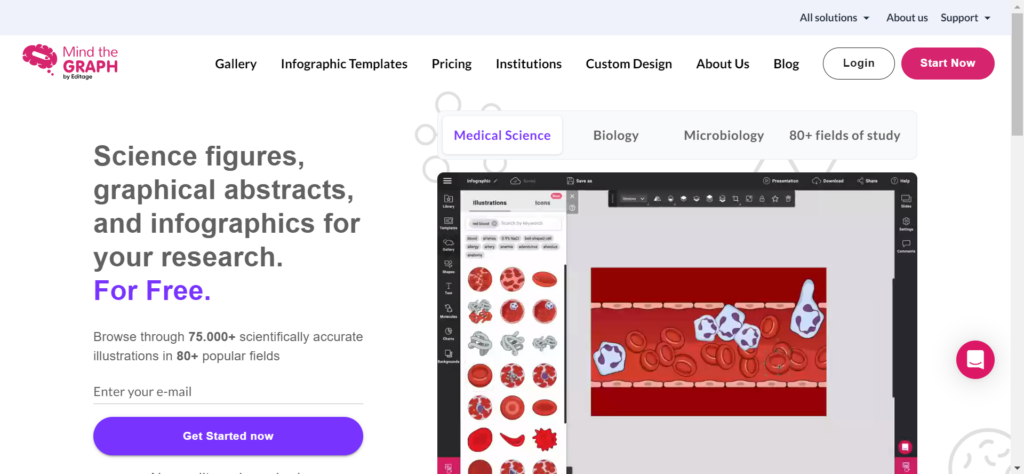
Mind the Graph is an online scientific illustration tool tailored for researchers, educators, and students to create visually stunning scientific graphics. With 75,000+ accurate scientific figures, this AI tool for research is ideal to visualize research for conferences, speeches, papers, classes, and much more. Mind the Graph stands out by providing detailed and precise illustrations, ensuring your scientific visuals are both impactful and accurate.
- Science Figures, Graphical Abstracts, and Infographics – Access over 75,000 scientifically accurate illustrations across 80+ popular fields, all for free.
- Templates – Save time with 300+ pre-made templates designed by science professionals for fields such as Medical, Biology, Molecular, and more.
- Customizable Graphical Abstracts – Enhance your research publications with visual representations. Free users can share publicly with a watermark.
- Drag and Drop – Easily select and manage illustrations, text, and templates with a simple drag-and-drop interface.
- On-demand Illustrations – Request custom illustrations if you can’t find exactly what you need.
- Online Platform – Access and edit your creations anytime, anywhere.
- Pre-made Resources – Customize pre-made templates and customize them with your own colors, text, and more to save time.
- Multiple Sizing Options – Ready-to-go templates in all popular sizes for various uses.
Mind the Graph – Pros and Cons
Mind the Graph – Pricing Plans
Mind the Graph offers three pricing plans:
- Starter Plan: This plan provides limited access to infographics and templates, making it suitable for those new to the platform or with minimal design needs.
- Student Plan: Priced at $5 per month, this plan offers access to a wider range of templates and illustrations, making it suitable for regular users who need to create more complex infographics.
- Researcher Plan: At $25 per month, this plan offers full access to all features, including advanced design tools and priority support. This plan is ideal for professionals and teams who require comprehensive design capabilities and faster response times.
Additionally, Mind the Graph offers a special service plan designed for academic and industry teams with advanced and personalized resource needs.
Scholarcy
Scholarcy is an AI tool for scientific research that simplifies the reading and engagement process with research articles, reports, and documents. It tackles the challenge of keeping up with the vast amount of new research by summarizing lengthy articles into concise sections, making it easier to grasp essential information.
Scholarcy highlights key elements such as study participants, data analyses, main findings, and limitations, and creates summary flashcards that link to open-access sources. It also offers a browser extension and a subscription-based personalized research library, making it a valuable resource for researchers, students, journalists, and policy analysts.
Features
- Suggests Background Reading: Scholarcy generates a list of background reading to help you quickly get up to speed in a new field. Also, it highlights terms and abbreviations in the text, making it easy to refer to them while you read.
- Highlights Important Points: Scholarcy’s Robo-Highlighter™ automatically identifies and highlights key phrases and significant contributions in academic papers. This advanced AI eliminates the need for manual highlighting, as it understands the structure of academic writing and pinpoints important points effectively.
- Creates a Referenced Summary: Scholarcy summarizes entire papers with references, rewriting statements in the third person to facilitate correct citation in reports, essays, or theses. The summarization process is fully customizable, allowing you to choose the number of words, level of highlighting, and degree of language variation.
- Finds the References: Scholarcy locates open-access PDFs from sources like Google Scholar and arXiv, using the UnPaywall API for assistance. It also allows you to download the entire bibliography in BibTex or .RIS format, making it easy to import references into your preferred reference management tool.
- Extracts Tables and Figures: Scholarcy identifies tables in PDFs or Word documents and enables you to download them in Excel format for further analysis. It also provides thumbnails of each figure, cross-referenced in the text, allowing you to quickly jump to the corresponding figure while reading.
Scholarcy – Pros and Cons
Scholarcy – Pricing Plans
Scholarcy offers Free and Scholarcy Plus priced at $45/year. The Scholarcy Plus plan offers enhanced features including the ability to generate detailed summaries, save flashcards, take notes, highlight and edit text, and organize flashcards into collections. Users can export up to 100 flashcards at once, create literature matrices, and generate one-click bibliographies.
Perplexity AI
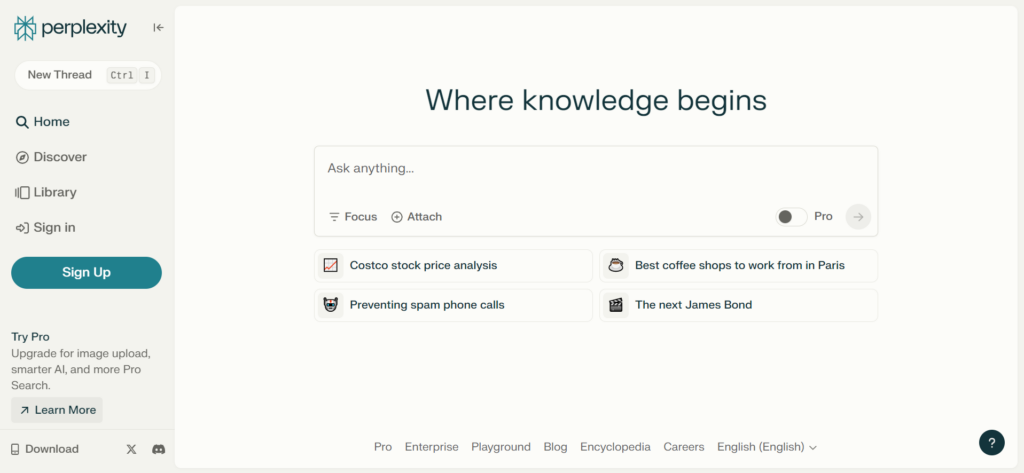
- Live Search Simplification – Perplexity simplifies the core concept of live search by providing concise answers instead of a list of search results. This approach saves users from reviewing multiple sources and delivers direct, clear responses.
- Answers Engine – Upon entering a query, Perplexity scours the live internet for resources that can answer the query. It then processes these search results through an AI model to generate concise answers, replacing traditional search result links with informative paragraphs.
- Cited Answers – Each answer generated by Perplexity is accompanied by citations from the source webpages. This feature allows users to use the AI tool for literature review effortlessly, cross-check information and ensure the reliability of the answers provided.
- Pro Search – The Pro Search feature acts like a mindful research assistant, narrowing down search scopes for optimal results. It leverages OpenAI’s GPT-3.5 model to process search data and deliver concise answers. Subscribers to Perplexity Pro can rewrite answers using different models, such as GPT-4, Claude 2.1, or Mistral Large, providing flexibility in the quality and style of responses.
- Answer Rewriting – Under every answer, there is a rewrite option for Pro subscribers. This allows users to refine or change the answer using a different AI model, enhancing the customization and accuracy of the information.
- Collections – Perplexity allows users to group related threads into folders called Collections. This feature is particularly useful for organizing research on specific topics. Users can sort threads, get new thread suggestions, and maintain a structured overview of their research.
- Thread Suggestions – New thread suggestions are provided for each collection, helping users expand their research and explore related topics efficiently. By grouping threads into Collections, users get a comprehensive view of their research topics. This organizational tool helps in quickly locating relevant information and managing extensive research projects effectively.
Perplexity AI – Pros and Cons
Perplexity AI – Pricing Plans
- Free Plan with basic search and summarization capabilities
- Perplexity Pro plan at $20/month or $200/year – Unlocks higher search volume and upgraded Pro Search, and Image Upload
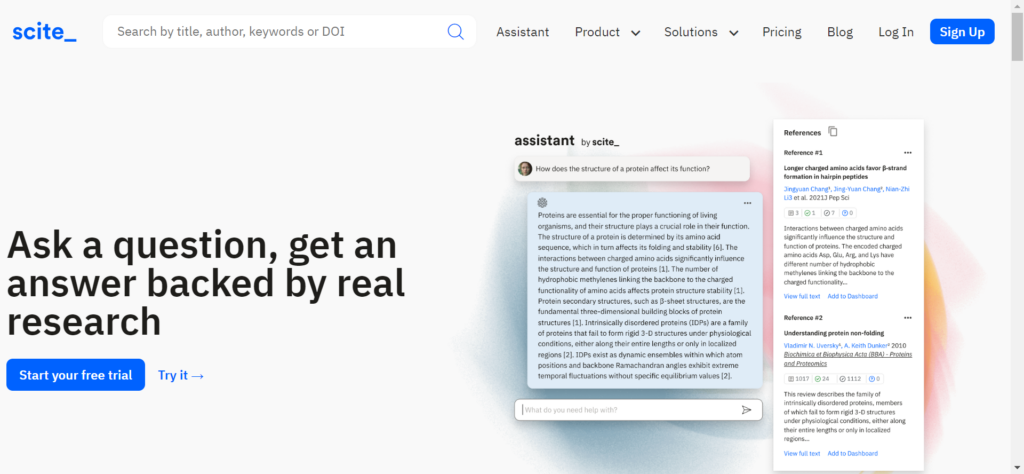
Scite AI is an AI research tool that analyzes over 1.2 billion citation statements from 187 million articles, books, preprints, and datasets offering insights into how publications are cited, indicating whether the citations are supportive or contrasting. Scite AI streamlines research with features like custom dashboards, reference checks, and pre-built journal metrics. The Assistant by Scite enhances research by leveraging large language models to generate AI-powered content for tasks such as literature exploration and decision-making, contributing to more reliable scientific research.
- Smart Citations: This feature provides detailed information about how a paper has been cited, including whether the citations are supporting or contrasting. This helps researchers evaluate the credibility and impact of scholarly articles more effectively.
- Reference Check: Researchers can upload their research articles to see how the references they are citing have been cited by others. This ensures that they are citing reliable work and helps identify any retracted references.
- Visualizations: Scite’s visualizations allow researchers to discover and evaluate scientific articles through interactive citation networks, making it easier to place a paper in the context of the wider literature.
- Browser Extension: The Scite browser extension for Chrome, Firefox, or Safari allows users to easily see how articles have been cited anywhere they are reading online, providing instant access to a vast amount of relevant information.
- Custom Research Dashboards: Researchers can track emerging citations to trending topics and research areas with custom Scite research dashboards, receiving email alerts when a study gets supported, contrasted, or receives a new editorial notice.
- Integration with ORCID: Scite offers ORCID integration for easy sign-up and syncing of articles, making it easier for researchers to manage their work and track citations.
Scite AI – Pros and Cons
Scite AI – Pricing Plans
Scite AI offers a 7-day free trial and upgrades to individual monthly or yearly plans. It costs $20/month or $105/year and offers access to all Scite AI features, including Smart Citations, Scite Report, and Scite Reference Check.
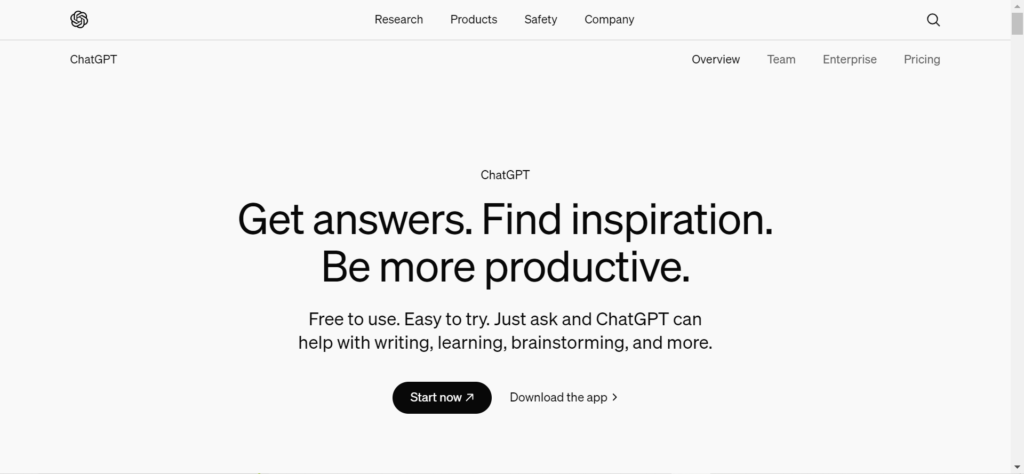
Applications of ChatGPT in Research
- Literature Review: ChatGPT can assist in conducting comprehensive literature reviews by summarizing key findings, identifying significant insights, and providing textual explanations. It can also help in identifying gaps in the literature and suggesting potential research directions.
- Data Analysis: Helps analyze data by generating textual reports, extracting key information, condensing information by rephrasing sentences, removing repetition, and providing compact information. It can also perform statistical analyses and draw out insights and interpretations.
- Research Idea Generation: Generates research ideas by providing suggestions for research methods, ranking them based on their potential effectiveness, and assisting in the development of research designs.
- Validation: Validate research findings by suggesting appropriate validation methods, metrics, or evaluation criteria. It can also assist in integrating validation frameworks into research designs.
- Language Translation and Multilingual Research: Translate text into multiple languages, making it a valuable AI research tool for non-native researchers, researchers working with international collaborators or accessing sources in different languages.
- Personalized Learning and Research Gateways: ChatGPT can summarize information, break down complex concepts, and compile vast information on a range of topics
- Brainstorming and Idea Generation: Helps in brainstorming and idea generation to formulate research questions or identify a new direction in research.
- Editing and Proofreading: ChatGPT can assist in editing and proofreading manuscripts by improving readability and spotting equation-based mistakes.
ChatGPT – Pros and Cons
ChatGPT – Pricing Plans
ChatGPT offers various subscription plans to cater to different needs:
- Free Plan: Provides access to ChatGPT using the GPT-3.5 model at no cost. Ideal for new users to explore ChatGPT’s capabilities. Note that this model is trained on data up to September 2021, so it may lack the latest information.
- ChatGPT Plus ($20/month): This plan includes faster response times and avoids wait times even during peak hours. It also unlocks advanced features such as image generation, interactive tables and charts, and priority access to OpenAI’s latest functionalities.
- ChatGPT Team ($25/month): Includes all features of ChatGPT Plus, with the added ability to create and share custom GPTs within a workspace, along with an admin console for managing the workspace.
- ChatGPT Enterprise (Customized Pricing): Designed for large organizations, this plan includes all features of ChatGPT Team, with unlimited high-speed access to GPT-4, expanded context windows, and enhanced security and administrative controls.
Today, AI tools for research have truly transformed the landscape of academic work. They’re not just fancy tools; they’re your new assistants in the lab or library, helping to streamline your research workflow, craft high-quality academic content, and speed up the journey to submission—all without the stress of missing deadlines. Imagine having a tireless research assistant who never sleeps, constantly helping you stay on top of your game.
But let’s not forget, while you use AI research tools to make your work effortless, it’s essential to keep your academic integrity intact. When you rely on AI tools, make sure to acknowledge their use in your work, and adhere to the guidelines set by your institution or chosen journal to maintain transparency and ethical use. And here’s a big one: don’t use AI research tools to plagiarize. Using AI to steal someone else’s work undermines your credibility and integrity as a researcher.
So, use AI tools responsibly and take your research to the next level, all while you stay true to the core values of academic integrity.
Paperpal is a comprehensive AI writing toolkit that helps students and researchers achieve 2x the writing in half the time. It leverages 21+ years of STM experience and insights from millions of research articles to provide in-depth academic writing, language editing, and submission readiness support to help you write better, faster.
Get accurate academic translations, rewriting support, grammar checks, vocabulary suggestions, and generative AI assistance that delivers human precision at machine speed. Try for free or upgrade to Paperpal Prime starting at US$19 a month to access premium features, including consistency, plagiarism, and 30+ submission readiness checks to help you succeed.
Experience the future of academic writing – Sign up to Paperpal and start writing for free!
Related Reads:
- Grammarly Review – Is Grammarly Worth it? [2024 Update]
- What are Journal Guidelines on Using Generative AI Tools
- QuillBot Review: Features, Pricing, and Free Alternatives
- An Analysis of How Paperpal Outperforms Other AI Writing Tools
How to Write an Abstract in Research Papers (with Examples)
Research funding basics: what should a grant proposal include, you may also like, free demo: revolutionize your research reading with paperpal’s..., introducing paperpal for overleaf: tailored to edit latex..., boost your earnings with paperpal’s newly launched affiliate..., paperpal recognized among best academic writing tools by..., paperpal review: features, pricing, and how to use, editage review: services, pricing and editage plus, 7 best plagiarism checkers in 2024 (compared), innovation and technology in peer review, introducing ai review, paperpal’s new virtual research coach..., how paperpal enhances english writing quality and improves....
- Interesting
- Scholarships
- UGC-CARE Journals
Top 7 Artificial Intelligence (AI) Tools in Scientific Research 2024
AI for Scientific Research: To write Research paper, Journal publication, Thesis writing, Data analysis, Plagiarism, and Grammer Check
Artificial intelligence (AI) is rapidly transforming the way we live and work, and scientific research is no exception. AI tools are being used to automate tasks, analyze data, and generate insights in ways that were not possible before. This is helping researchers to make faster progress, achieve breakthroughs, and improve the quality of their work.
AI has revolutionized numerous industries, and scientific research is no exception. By harnessing the power of AI, PhD scholars, and scientists can streamline their research processes, enhance data analysis, and accelerate discoveries.
In this article, iLovePhD will explore several remarkable AI tools that have proven to be invaluable assets for researchers. Whether you’re conducting experiments in the lab, writing scientific articles, publishing in journals, or working on your thesis or dissertation, these tools can greatly enhance your efficiency and productivity.
Table of Contents
- Introduction
- Scite Assistant
- Research Rabbit
- Writing research articles
- Journal publication
- Thesis or dissertation
Final Takeaway
Artificial intelligence (ai) tools in scientific research: revolutionizing discovery and efficiency.
There are some AI tools available to help researchers with their work. Here are a few of the most popular:
1. Scite Assistant
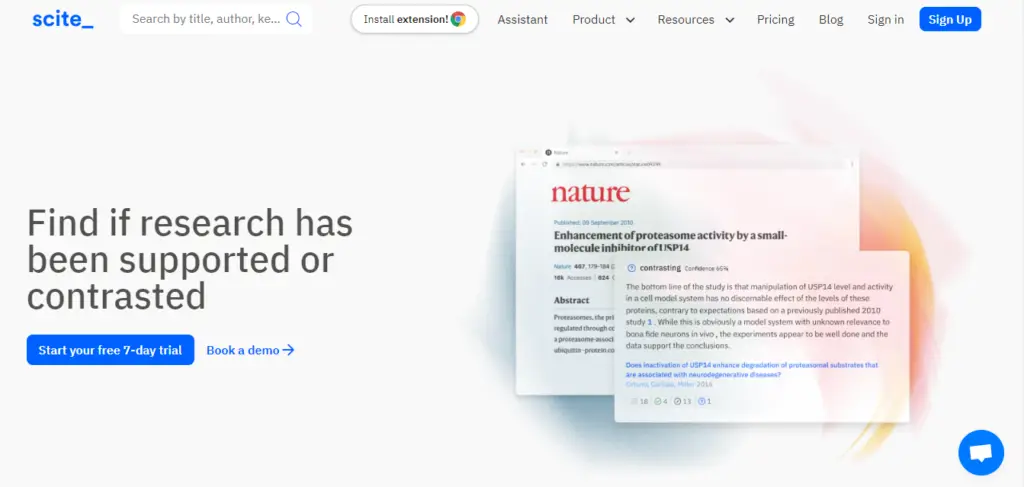
Scite Assistant is an AI-powered research tool that helps researchers to find, read, and understand scientific literature. It can automatically extract key information from papers, such as the research question, methods, results, and conclusions. Scite Assistant can also help researchers to identify relevant papers, track their progress, and collaborate with others.
Visit Scite Website
Also Read: Scite – A Free Smart Citations Tool for Better Research
2. Consensus
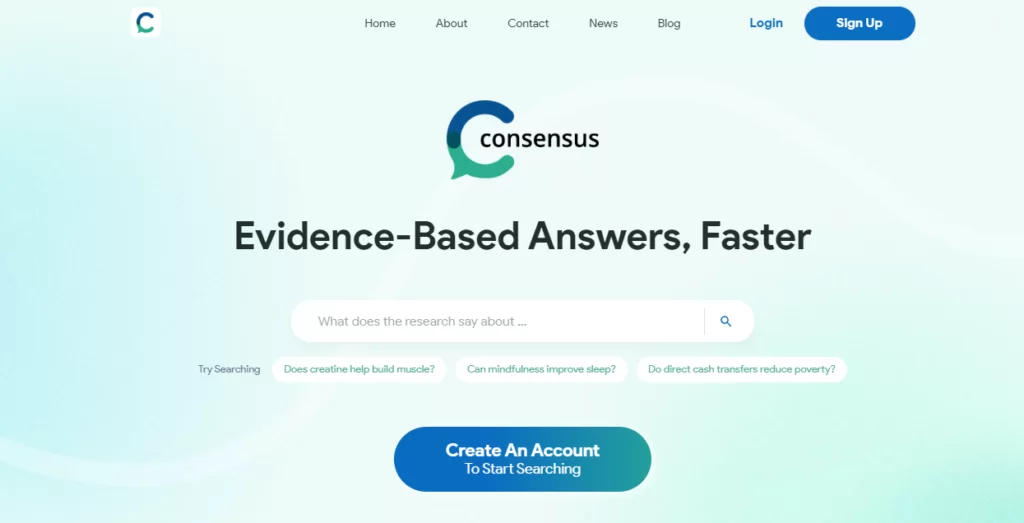
Consensus is an AI search engine that helps researchers to find relevant research papers. It uses machine learning to identify papers that are likely to be relevant to a given research question, even if they do not use the same keywords. Consensus also provides summaries of each paper, making it easy to assess their relevance.
Visit Consensus Webiste
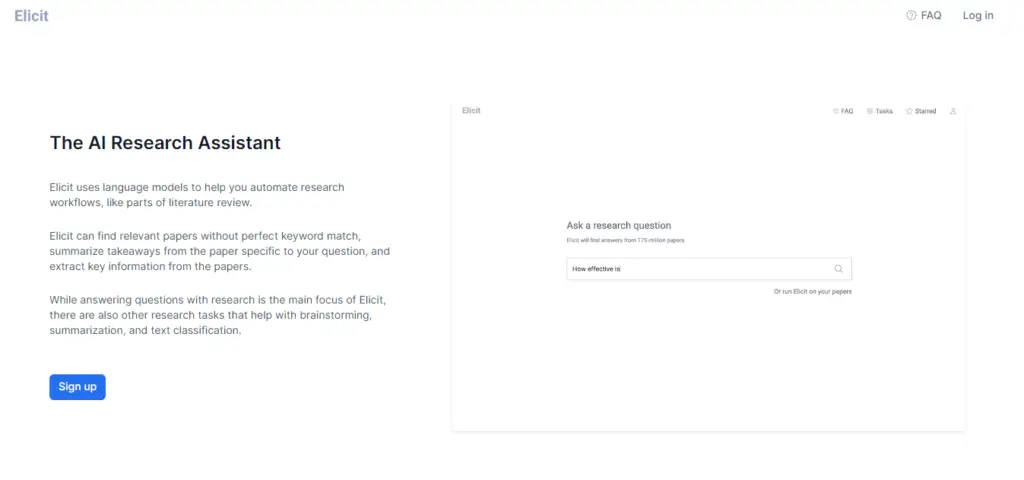
Elicit is an AI research assistant that helps researchers to brainstorm, research, and write. It can generate ideas, find relevant information, and help to structure arguments. Elicit can also be used to create presentations and posters.
Visit Elicit Website
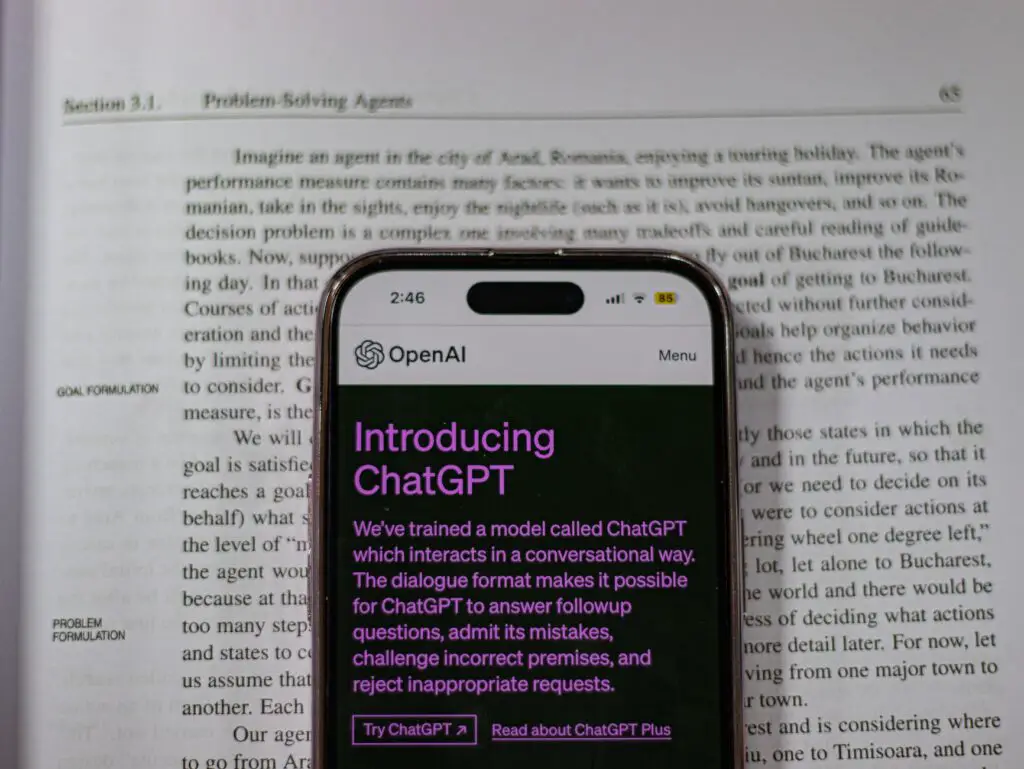
ChatGPT is an AI chatbot that can be used to generate text, translate languages, and answer questions. It can be used by researchers to get feedback on their work, find information, and collaborate with others.
Visit ChatGPT
How to Use ChatGpt to Write a Scientific Research Paper?
Detecting ChatGPT-Generated Research Articles: The Power of AI Detection Tools
How to Use ChatGPT to Read Research Articles -Trending Now!
10 Tips to Quickly Publish Research Article with ChatGPT
Google Bard vs ChatGPT: Which One Should You Use?
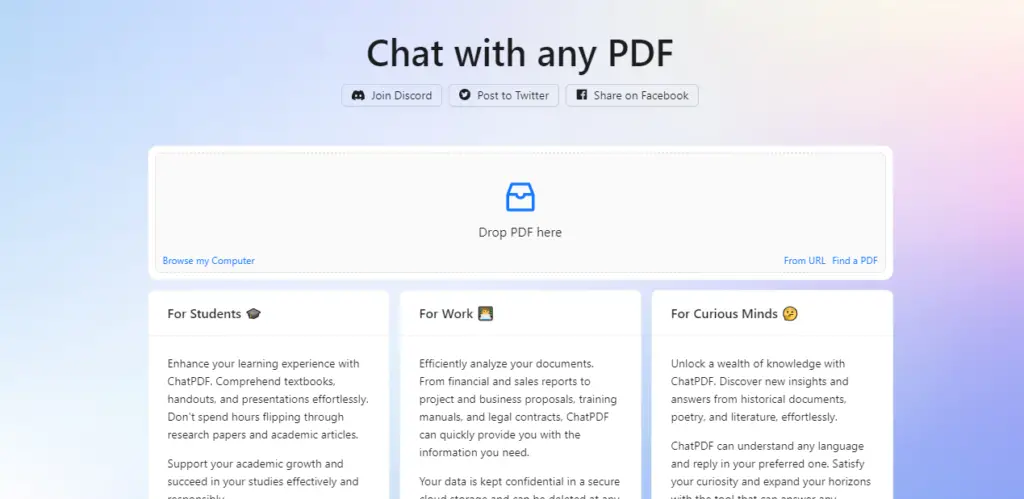
ChatPDF is an AI tool that can help researchers to understand PDF files. It can automatically extract text from PDFs, translate languages, and answer questions about the content. ChatPDF can be used to save time and improve the accuracy of research.
Visit ChatPDF
6. Research Rabbit
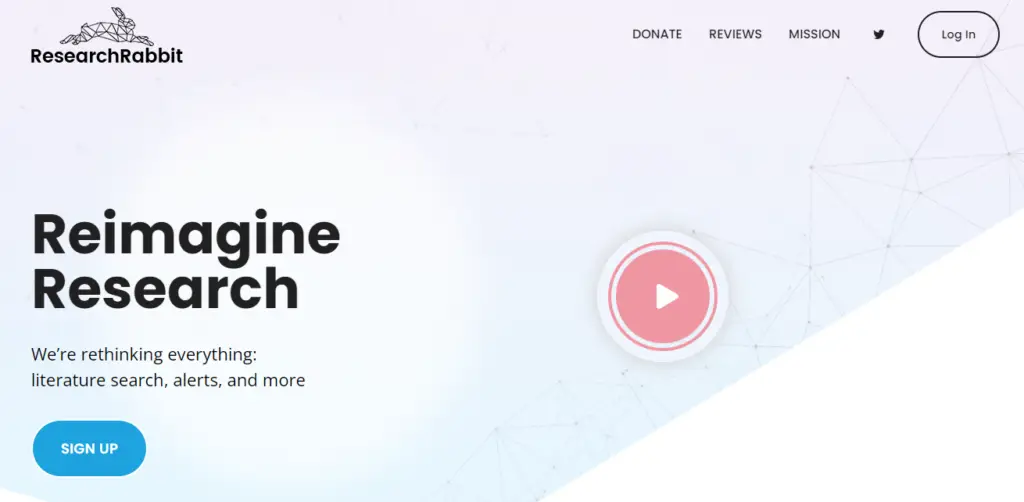
Research Rabbit is an AI tool that helps researchers to manage their research. It can track citations, create bibliographies, and generate summaries of papers. Research Rabbit can help researchers to stay organized and make better use of their time.
Visit Research Rabbit Website
7. SciSpace

SciSpace or Typeset.io is an AI-powered platform that helps researchers to publish their work. It provides a one-stop shop for everything from manuscript submission to peer review to publication. SciSpace can help researchers to save time and get their work published faster.
Visit SciSpace Website
How AI Tools Can Help PhD Scholars and Scientists
AI tools can be a valuable resource for PhD scholars and scientists at all stages of their research. They can help to:
- In the lab : AI tools can be used to automate tasks, such as data collection and analysis. This can free up researchers to focus on more creative and strategic work.
- Writing research articles: AI tools can be used to help researchers to brainstorm, write, and edit their work. They can also be used to generate citations, create bibliographies, and check for plagiarism. It will help you to write a research article .
- High IF Journal publication: AI tools can be used to help researchers to find relevant journals, submit their papers, and track their progress through the publication process. It will help you to publish in high-impact factor journals .
- Streamlined Experimentation: AI tools assist in designing experiments, optimizing parameters, and automating data collection, saving time and reducing human errors.
- Advanced-Data Analysis: These tools provide sophisticated algorithms for data analysis, enabling researchers to uncover patterns, identify trends, and derive meaningful insights from complex datasets. It will help you to analyze data efficiently .
- Literature Review and Paper Writing: AI-powered tools can aid scholars in conducting comprehensive literature reviews, generating summaries, and organizing references, facilitating the writing process.
Step-by-Step Guide: How to Use ChatGPT to Write a Literature Review With Prompts
- Journal Publication: AI tools help researchers identify suitable journals, check manuscript compatibility, and provide language editing suggestions, improving the chances of successful publication.
- Thesis or Dissertation Writing: AI tools can help researchers write their thesis or dissertation. They can help organize the research, check grammar and plagiarism, generate ideas, and write a clear and concise argument. It will help you to write your thesis and dissertation efficiently .
ChatGPT prompts to write a PhD Thesis
AI tools are a powerful new tool for scientific research. They can help researchers save time, improve their work, and progress faster. If you are a PhD scholar or scientist, I encourage you to explore the many AI tools that are available. You may be surprised at how much they can help you.
Also Read: How to Use ChatGPT for Formulating Clear Research Questions ?
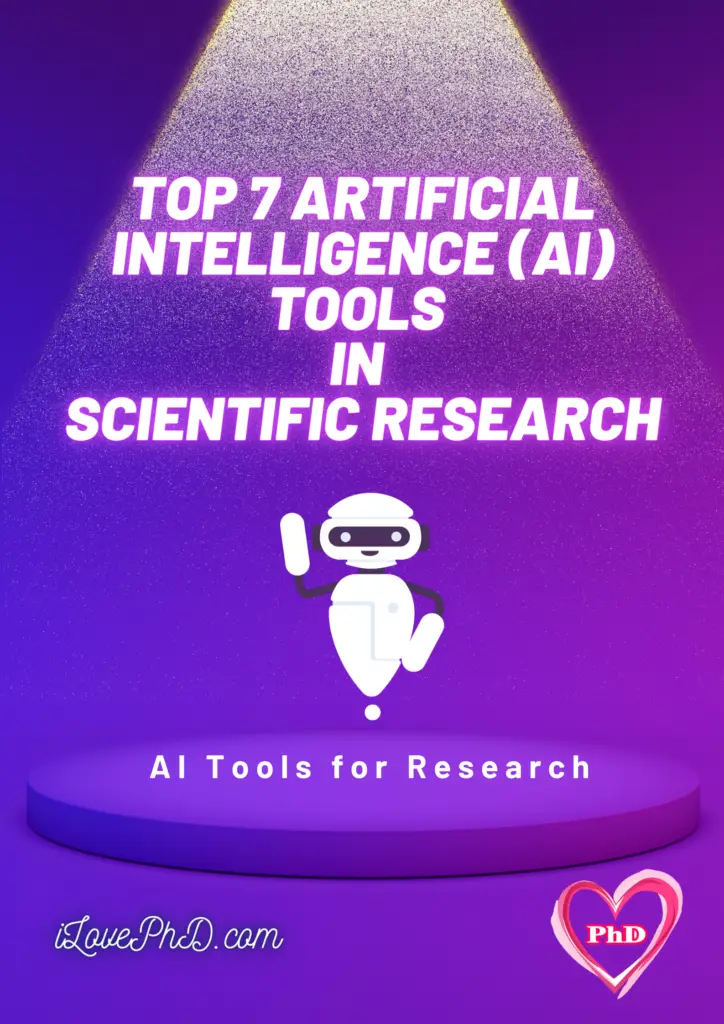
Top Keywords to Identify this article
Best AI tools for scientific research 2024 Top AI tools for researchers 2024 AI tools for scientific data analysis 2024 Artificial intelligence applications in research 2024 AI technology for scientific innovation 2024 Leading AI tools in scientific research 2024 Most advanced AI tools for researchers in 2024 Artificial intelligence tools for researchers in 2024 AI tools in scientific discovery 2024 AI in Research 2024 best tools
- AI tools in scientific research
- AI-driven data analysis
- Data Analysis
- data analysis in research
- enhancing research efficiency
- Grammer Check
- Journal Publication
- journal publication tools
- plagiarism and grammar check tools
- Research Paper
- Research Paper Writing
- scientific research tools
- streamlining scientific research
- thesis writing
- thesis writing tools
Science Academies Summer Research Fellowship 2025
Fellowships in india 2025 -comprehensive guide, most popular, top 100 journal publications in the world 2024, applications now open: 2025-26 lee kong chian nus-stanford fellowship, phd memes about research life | high impact phd memes, how to write a research paper a complete guide, 24 best online plagiarism checker free – 2024, six effective tips to identify research gap, what is a scopus indexed journal, best for you, what is a phd a comprehensive guide for indian scientists and aspiring researchers, popular posts, popular category.
- POSTDOC 317
- Interesting 260
- Journals 236
- Fellowship 136
- Research Methodology 103
- All Scopus Indexed Journals 94
Mail Subscription

iLovePhD is a research education website to know updated research-related information. It helps researchers to find top journals for publishing research articles and get an easy manual for research tools. The main aim of this website is to help Ph.D. scholars who are working in various domains to get more valuable ideas to carry out their research. Learn the current groundbreaking research activities around the world, love the process of getting a Ph.D.
Contact us: [email protected]
Google News
Copyright © 2024 iLovePhD. All rights reserved
- Artificial intelligence

IMAGES
COMMENTS
The swift technological advancement of AI tools for PhD research has profoundly impacted academic research, improving the ability to handle complex tasks and increasing efficiency. As scholarly research progresses, AI tools have become essential for researchers seeking to streamline their work and boost productivity.
Apr 29, 2024 · Limitations of AI Tools for Research. Many of the best AI tools for research suit different types of people, and these tools have streamlined tasks and uncovered connections. However, they still have many limitations compared to manual research processes. Here's a closer look at the limitations of AI Research Tools. 1. Accuracy and Bias: AI ...
Apr 26, 2024 · AI-powered research tools and AI for academic research. AI research tools, like Concensus, offer immense benefits in scientific research. Here are the general AI-powered tools for academic research. These AI-powered tools can efficiently summarize PDFs, extract key information, and perform AI-powered searches, and much more.
Oct 9, 2024 · By leveraging the capabilities of these top 10 AI tools, researchers can save time, improve the quality of their work, and contribute to groundbreaking discoveries in their respective fields. Best Tips How to Make the Most of AI Tools as a PhD student. PhD students employ AI-chatbots, such as ChatGPT, to enhance their studies and boost efficiency.
Jun 18, 2024 · From data analytics to natural language processing, these AI tools are not just aiding in the collection of data but are enhancing the accuracy and efficiency of academic pursuits. Here's a glimpse into the top 10 AI tools that are reshaping academic research in 2024, ensuring researchers can gather more precise information faster than ever before.
Feynman AI is a cutting-edge tool aiding academic research. It streamlines reading, writing, and comprehending academic papers. Features include an AI-powered research library, question-answering about read content, flashcards for rapid learning, and a comparison tool for identifying similarities and differences between papers.
Aug 7, 2024 · AI tools provide a transformative approach to traditional research methods, significantly enhancing efficiency and productivity in academic research. These tools offer researchers a comprehensive platform for data analysis, note-taking, and writing, streamlining the entire research process.
Jun 26, 2024 · Scite AI is an AI research tool that analyzes over 1.2 billion citation statements from 187 million articles, books, preprints, and datasets offering insights into how publications are cited, indicating whether the citations are supportive or contrasting. Scite AI streamlines research with features like custom dashboards, reference checks, and ...
Nov 25, 2024 · The best AI tools for postgraduate research are AskYourPDF, ChatPDF, Scite, Consensus, ResearchRabbit, PDFGear, and Trinka. These AI tools efficiently identify relevant academic papers, streamline literature reviews, and offer advanced functionalities for AI research.
Nov 17, 2024 · Artificial Intelligence (AI) Tools in Scientific Research: Revolutionizing Discovery and Efficiency. There are some AI tools available to help researchers with their work. Here are a few of the most popular: 1. Scite Assistant. Scite Assistant is an AI-powered research tool that helps researchers to find, read, and understand scientific ...